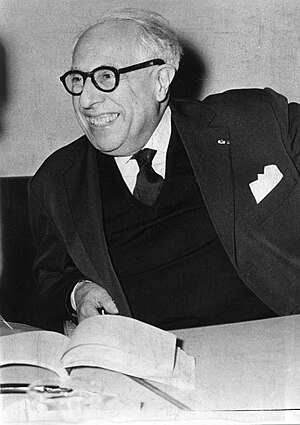Jean Cassou
Jean Cassou (born July 9, 1897 in Deusto , Spain ; † January 15, 1986 in Paris ) was a French writer , art historian , curator and translator who led a very eventful, but always politically engaged life.
He fought in the Resistance and built up the Musée National d'Art Moderne in Paris after the end of the war . In his narrative prose, he combined “inwardness of life with romantic and speculative elements”, says the Brockhaus encyclopedia . According to Winfried Engler, his poetry is strongly influenced by Spanish poetry. Cassou published numerous works on artists and aesthetic issues.
Life
The son of a Spanish mother studies Hispanic Studies at the Sorbonne in Paris, escapes participation in the First World War as a Magister at the Lyceum in the Basque city of Bayonne , writes monthly Spanish letters for the Mercure de France , translates books by Miguel de Cervantes , Miguel de Unamuno , Blasco Ibanez , Ramón Gómez de la Serna , Lope de Vega into French, which he crowns with a history of contemporary Spanish literature published in 1929. He made his novel debut in 1925. He was increasingly concerned with the preservation of monuments. In 1936 he was appointed to the staff of the Popular Front Minister for Education and Art, Jean Zay . Cassou sympathizes with the Spanish Republic (which he also visits) and the Communist Party, but breaks with them in 1939 on the occasion of the Hitler-Stalin Pact . After the Second World War he will equally protect himself against the excesses of Stalinism, the anti-communist paranoia in the USA and the French terror in Algeria. He did underground work against the German occupiers of France (and their collaborators), which in December 1941 brought him to a prison run by the Vichy regime for a year . This is where the Thirty-Three Sonnets are written - in the head, since writing is forbidden. In the summer of 1944, Cassou wrestled for his life in the hospital for several weeks after colliding with a Nazi patrol; General de Gaulle hands him the Croix de Liberation at the bedside . From 1945 to 1965 he was director of the newly founded Musée National d'Art Moderne , then professor of sociology. In 1971 he was awarded the Grand Prix national des Lettres and in 1983 the Grand Prix de la Sociéte des Gens de Lettres . Since 1964 he has also been a member of the (Belgian) Academie Royale de Langue et de Litterature Francaises de Belgique . Five years before his death (1986) he published his memoirs under the title A Life for Freedom .
Works
- Eloge de la folie. Novel. 1925.
- Les harmonies viennoises. Novel. Paris 1926, German Esterhazy Palace. Vienna 1927.
- Le Pays qui n'est à personne. Novel. Paris 1927.
- La Clef des songes. Novel. 1928.
- Vie de Philippe II. Paris 1929.
- Panorama de la litterature espagnole contemporaine. Paris 1929.
- Comme une grande image. Novel. 1931.
- Les Nuits de Musset. Essay. Paris 1931.
- El Greco. Essay. 1931.
- Grandeur et infamie de Tolstoy. Essay. 1932.
- Les Inconnus dans la cave. Novel. Paris 1933.
- Pour la poésie. Essay. 1935
- Les massacres de Paris. Novel. 1935 (about the uprising of the Commune), German massacre of Paris. Berlin 1948.
- Cervantes. Essay. 1936.
- La querelle du réalisme , ESI, 1936
- Legion. Paris 1939.
- Quarante-huit. Essay. Paris 1939.
- Trente-trois sonnets composés au secret. Poems. 1944, German Thirty-three sonnets from prison. Wiesbaden 1957
- Le center du monde. Novel. 1945.
- Les enfants sans age. Novellas, 1946, German Ageless Children. Urach 1949.
- Raoul Dufy. Essay. 1946.
- Auguste Rodin. Essay. 1949.
- Situation de l'Art Moderne. Essay. Paris 1950.
- La folie d'Amadis et autres poèmes. Poems. Paris, 1950.
- La Voie Libre. Paris 1951.
- Le nu dans la peinture européenne. Essay. Paris 1952, German The nude in painting. Zurich 1952.
- La rose et le vin. Poems. Paris 1952.
- Les impressionnistes et leur époque. Essay. Paris 1953, German The Impressionists and their time. Berlin 1953, Stuttgart 1957.
- Trois Poètes: Rilke, Milosz, Machado. Paris 1954.
- La Mémoire courte. Essay. Paris 1954. (New edition: Éditions mille et une nuits, Paris 2001, ISBN 2-84205-548-9 )
- Le livre de Lazare. Novel. 1955.
- Ballades. Poems. 1956.
- Le temps d'aimer. Novel. 1959.
- Picasso. Essay. Paris 1959, Gütersloh / Stuttgart 1976.
- Parti pris. Essay. Paris 1961.
- Dernières pensées d'un amoureux. Novel. Paris 1962.
- Chagall. Essay. German Munich 1966, Berlin 1966, Gütersloh / Stuttgart 1982.
- Le voisinage des cavernes. Novel. 1971.
- La Création des mondes. Essay. Paris 1971.
- Une vie pour la liberté. Autobiography, 1981.
literature
- Pierre Georgel: Cassou. Paris 1967.
Individual evidence
- ↑ 19th edition, fourth volume from 1987.
- ↑ Winfried Engler : Lexicon of French Literature (= Kröner's pocket edition . Volume 388). 2nd, improved and enlarged edition. Kröner, Stuttgart 1984, ISBN 3-520-38802-2 .
- ↑ See Friedmann
- ↑ This essay "was considered a happy synthesis of critical and creative principles when it was published", says Winfried Engler's 1984 Lexicon of French Literature .
- ↑ Two sonnets were set to music by Henri Dutilleux
Web links
- Literature by and about Jean Cassou in the catalog of the German National Library
| personal data | |
|---|---|
| SURNAME | Cassou, Jean |
| BRIEF DESCRIPTION | French writer, art historian and translator |
| DATE OF BIRTH | July 9, 1897 |
| PLACE OF BIRTH | Deusto near Bilbao, Spain |
| DATE OF DEATH | January 15, 1986 |
| Place of death | Paris |
